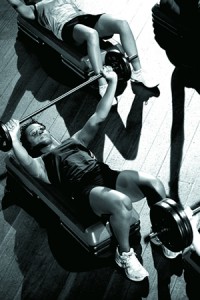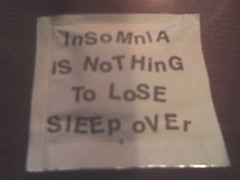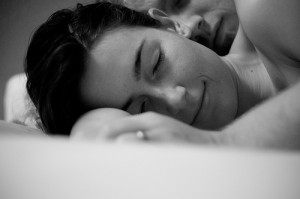by Michelle Sutton-Kerchner
Want to improve your health, body weight, mental outlook, career, and relationships? Get some sleep!
Right up there with exercise and proper nutrition, sleep rates as a critical determinant in one’s health. Anyone who is sleep deprived can share many ways this lack affects his/her ability to function. Although some sleepless scenarios are unavoidable, such as caring for a newborn, often a better night’s rest is within your control.
Sleep Deeply
Daily exercise assures better quality of sleep, which is equally important as quantity. The expenditure of energy through a regular fitness routine allows a deeper sleep, which is more refreshing. It’s also restorative.
Whether suffering from a chronic illness or a simple muscle strain, the rest gained through sleep encourages healing. It regulates the production of endorphins, which can act as natural “pain-killers,” and serotonin, which affects mental outlook. This, in part, explains depression in post-partum mothers and caretakers who are on duty around the clock.
Even the standard eight-hour stint can leave you feeling fatigued if those hours are spent restless. This is especially good news for those unable to grab a long enough stretch. Although you may feel sluggish when circumstances dictate little sleep, including light exercise in your day makes the most of the hours you are asleep. Physical activity also delivers a jolt of energy to help keep you going the rest of the time.
Exercise Early
Exercise during any time of day benefits sleep. However, a morning workout tends to kick off one’s circadian rhythms (internal clock) to be alert throughout the rest of your waking hours. Exercise in the morning, and take advantage of the natural energy boost that follows to fuel your day.
Research proves moderate exercise for at least half-hour, seven days per week, has the best outcome for a good night’s rest. Those who stretch also have a positive sleep response. For insomnia, some experts advise exercising later in the day. However, adequate time still should be allowed prior to sleeping for the body to become calm. Avoid strenuous exercise within two hours of bedtime.
Exercise in a State-of-Confusion

Exercise is overall more effective when we change our routine approximately every six weeks. Your personal trainer or fitness instructor is aware of this plateau possibility and strives to keep workouts fresh. Continuously evolving your fitness program helps maintain or achieve a healthy weight, increases muscle mass, and improves cardiovascular function. It also improves sleep patterns.
Constantly introducing new exercise techniques provides optimum stimulation. Physically exerting yourself in a healthy way defines exercise. The body remains challenged as does the mind while it learns new movements. Healthy exhaustion ensues, producing an easier ability to fall, and stay, asleep. Without challenge, the body and mind quickly grow bored and abandon exercise, perhaps even lazing in a bedtime-jeopardizing nap instead. Boring.
Vicious Cycle of Insomnia
Struggling with insomnia or a bout of poor sleeping increases more of the same. You become so tired from lack of sleep, you don’t have energy for exercise. Without exercise, you have further decreased energy and physical activity, making sleep more elusive.
Despite how you feel during these episodes, it’s often helpful to force oneself to exercise. Stay active for an entire day through the exhaustion. Focus on the big picture. With one improved night of sleep accomplished, more can follow. Sleep does indeed beget sleep.
 Anxiety can be a natural response to insomnia. Being unable to sleep when your body cries for rest is frustrating and frightening. This overwhelming anxiety makes sleep more difficult. Emotions feed on themselves, further spiraling the situation. Listen for these thoughts. When they enter your mind, greet and release them.
Anxiety can be a natural response to insomnia. Being unable to sleep when your body cries for rest is frustrating and frightening. This overwhelming anxiety makes sleep more difficult. Emotions feed on themselves, further spiraling the situation. Listen for these thoughts. When they enter your mind, greet and release them.
Jon Kabat-Zinn, PhD, author of Wherever You Go, There You Are, offers a waterfall metaphor: View thinking itself as a waterfall, a cascading of thought. Go beyond your thinking much as you would find a vantage point to experience a waterfall. You’re able to see and hear the water, yet remain out of the torrent. Acknowledge when anxiety enters your mind, from insomnia or otherwise– but, don’t let it become you. This process invites a transforming calm to replace anxieties about living normally, in this case with adequate sleep.
Exercise also helps reduce anxiety itself. As a powerful mood booster and stress-reducer, a regular fitness routine helps keep spirits light even when eyes are heavy. Exaggerated emotions can be a byproduct of sleep deprivation. Use exercise to increase production of feel-good hormones, and lessen anxiety as well as depression and irritability.
Researchers at the Stanford University School of Medicine studied the effects of exercise on sleep patterns of people ages 55 to75 who were not physically active and had insomnia. The study group introduced moderate exercise on alternating days for 20 to 30 minutes in the afternoon. As a result of this exercise regimen, they fell asleep 50 percent quicker and stayed asleep approximately one hour longer. A promising sleep-aid indeed, with no groggy side-effects!
Moves for the Best Snooze
Aerobic exercises, which increase the amount of oxygen in the bloodstream, are best for combating restless nights. Cycle, dance, Zumba, swim, hit the treadmill. Pump up the cardio. Any physical activity that reaches a level of exertion is helpful.
Warm-up and cool-down sessions are especially critical for tired exercisers to help avoid injury. When tired, technique is easily sacrificed for sloppy, incomplete, or hurried movement. Consider teaming with a personal trainer during these sleepy times or if you tend to work out at day’s end. A professional’s keen eye can monitor your form for safe, effective results on any given day.
The goal of exercising for better sleep is to produce healthy physical stress. The brain responds to this healthy exhaustion by increasing time spent in the deepest stage of sleep. You can’t always guarantee the optimum hours of rest; however, enjoyable, replenishing sleep can be possible during the hours you do manage.

Sleep Requirements
Sleep needs change throughout life. Here are general guidelines to follow:
- Newborns: 12 to18 hours (may feel like 10-minute increments)
- Infants (3 months to 1 year): 14 to 15 hours
- Toddlers (ages 1 to 3 years): 12 to 14 hours
- Preschoolers (ages 3 to 5): 11 to 13 hours
- Children ages 5 to 12 years: 10 to 11 hours
- Children ages 12 to 18 years: 8.5 to 10 hours
- Adults: 7.5 to 9 hours
Sleep deprivation hinders reaction time, coordination, productivity, and judgment. Click here for a fun sheep-dash game to determine if you could use some extra shuteye: Sheep Dash Test (BBC) at http://www.bbc.co.uk/science/humanbody/sleep/sheep/
Beyond Drowsiness
Poor quality and quantity of sleep can result in health issues beyond daytime drowsiness. Endocrine, metabolic, and neurological functions are impaired during a sleep deficit. Reducing Zzzs may seem a good short-term solution to fitting more into your day. However, chronic sleep issues (such as shortened sleep-time) are associated with long-term health conditions, including heart disease, high blood pressure, obesity, and diabetes. Colds, flu, and infections are also more frequent in the sleep deprived.
A consistent exercise routine combats these health threats. A workout compensates by improving cardiovascular health, decreasing blood pressure and blood sugar levels, and helping maintain proper body weight. If you have to set the alarm earlier or burn that midnight oil, reimburse your immune system with an energizing workout.
Think of the amazing things your body accomplishes every day. Reward it with the quality sleep best achieved through a good workout.
Sources
“How Much Sleep Do You Need?” at www.helpguide.org.
“Learn How to Fight Fatigue,” by Chris Iliades at www.everydayhealth.com.
“Morning Exercise Improves Sleep,” by Mark Stibich at www.about.com.
“Want to Sleep Better? Exercise!” at www.sleeplikethedead.com.
Image Credits
Evil alarm clock: © Julien Tromeur at www.dreamstime.com
Insomnia sign: http://www.flickr.com/photos/jmarty/227332939/
Peaceful sleep: http://www.flickr.com/photos/mikecpeck/2104496895/
 Fitness & Wellness News Your Source for Fitness News, Wellness News, Health News, and Nutrition News!
Fitness & Wellness News Your Source for Fitness News, Wellness News, Health News, and Nutrition News!



